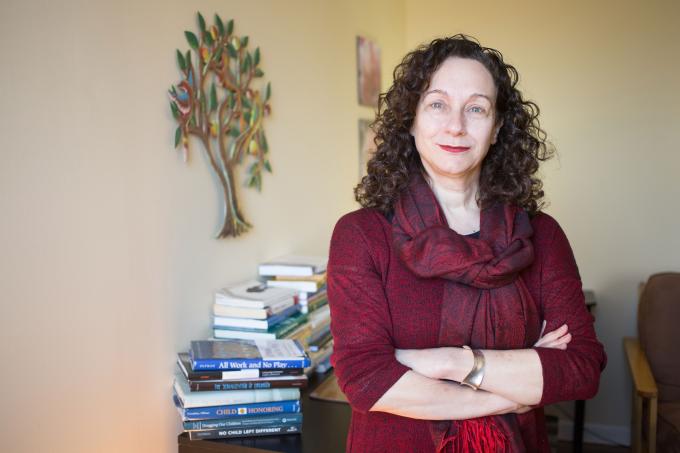Dr. Sharna Olfman explores better mental health treatment for kids

The Point
Spring 2015
As a young child psychologist in the mid 1990s, looking for a kindergarten for her son, Sharna Olfman, Ph.D., was "taken aback to discover how much emphasis was placed on formal academics, rather than creative play. Many schools had 'entrance exams,' a concept that seemed so foreign to me, for 4 year olds!" It was an experience that helped her see a connection among developmentally inappropriate school environments and children's mental health. A professor of developmental psychology, Olfman explores this topic and others in her latest book, The Science and Pseudoscience of Children's Mental Health. Aimed at mental health practitioners, concerned parents, and child advocates alike, Olfman's book is an effort to better understand the causes of children's psychological disturbances - and as a result, the proper treatment of these issues. A native of Montreal, Olfman relocated to Pittsburgh in the early 1990s and has been teaching at Point Park for 22 years. She spoke with The Point about her work and the importance of connecting with children in a meaningful, thoughtful way.
How did you become interested in children's mental health?
SO: Parenting in a culture that doesn't always support children's developmental needs certainly heightened my interest in, and advocacy on behalf of, children. My book series Childhood in America for Praeger Publishers offers me a platform to research and write about child psychology. I'm fortunate in that I get to meet and work with scholars, activists and clinicians who are leaders in the field of children's mental health, and I bring this experience into the classroom.
What are your key areas of research?
SO: I'm interested in identifying environments that best support children's psychological and neurological development; for example, optimal parenting practices and educational settings. I have explored the importance of creative play in natural settings and the impact of screen technologies on children's mental health, and I've written extensively about the overuse and abuse of psychiatric drugs in treating children. When we create environments that are not ideal for children, rather than changing the environment, we often medicate them to conform.
Has the approach to treating children's mental health changed for the better, or not enough?
SO: There have been changes; unfortunately some are misguided. We need to move away from the pseudoscience of the 'chemical imbalance theory' and look to the real science of brain development and epigenetics, which identifies the inextricable interplay of genes and environments. This approach has led to breakthroughs in the understanding of children's psychological disturbances and serves to discredit the scientifically unsupported 'chemical imbalance theory' of mental illness.
How can the public at large be better informed about issues concerning children's mental health?
SO: Millions of children who are struggling with emotional and psychological disturbances are taking psychiatric drug cocktails that may be harming their developing brains. This issue is too important to be buried in obscure scientific journals. Platforms like my book series and film offer a more visceral way of presenting this information to the public. I'm so pleased to have launched my new book alongside Kevin Miller's new documentary, Letters from Generation Rx, last April. His films are not only compelling but they're based in sound science. Books and films have the power to deliver vital research directly into the hands of parents and professionals, so that they can make informed choices on behalf of the children in their care.
How has the popularity of handheld devices impacted child interaction?
SO: Technologies will not turn our children into 'baby Einsteins,' but loving human interaction may. Children or parents distracted by screens will undermine the attachment relationship that is at the core of healthy psychological development. The relationships that infants form with their caregivers have a lasting impact on brain and emotional development. It doesn't matter where an infant or young child is receiving care; at home with a parent, or nanny, or in a daycare setting, as long as it is with consistent, responsible and emotionally available caregivers.
How important is diet in a young child's development?
SO: Much of what we eat today would not be recognized as food by our grandparents. A child's developing brain is a complex and fragile organ that has very specific micro-nutrient (vitamins and minerals) requirements. We need to eat real food, with a full complement of colorful vegetables, whole grains and proteins. A diet based in processed foods, heavy in fat, sugar and artificial chemicals undermines brain function and brain development.
What's important to understand about the impact of concussions on young children?
SO: With heightened concern about concussions in young athletes, some parents and coaches are trying to address the problem with more protective gear. However, as concussion expert Daniel Gallucci explains in Science and Pseudoscience, helmets protect the skull but not the brain, and they can create a false sense of security. If a child sustains a concussion, it is of vital importance that she rests not only her body, but also her brain, which requires an enormous reservoir of energy to heal. Following a requisite period of rest, new approaches that integrate functional neurology, micro-nutrient therapies, and psychotherapy can restore brain function to a far greater extent than we formerly believed possible.
Interview by Barbara Vilanova
Photo by John Altdorfer
The Point is a magazine for alumni and friends of Point Park University.

